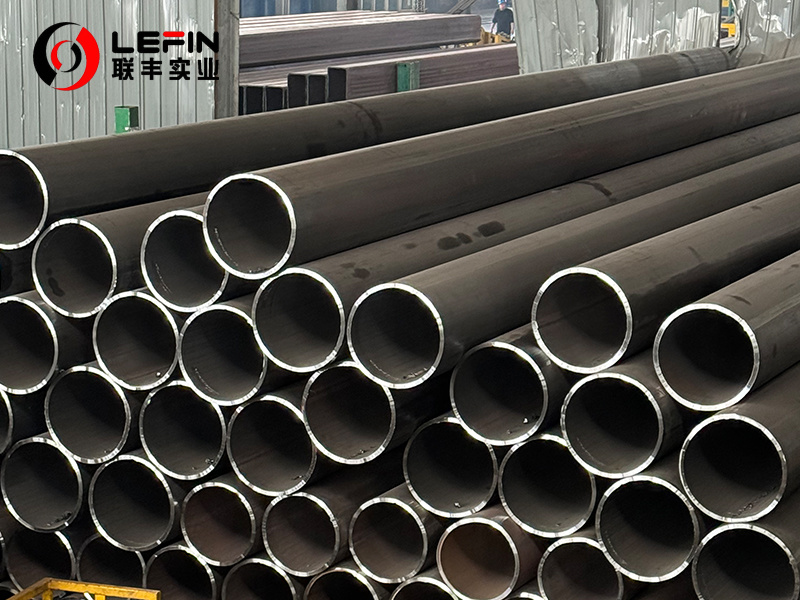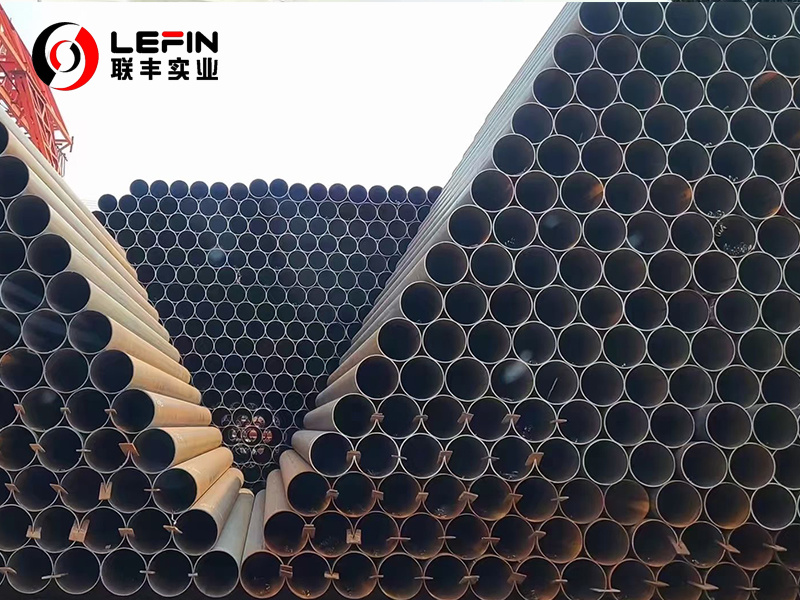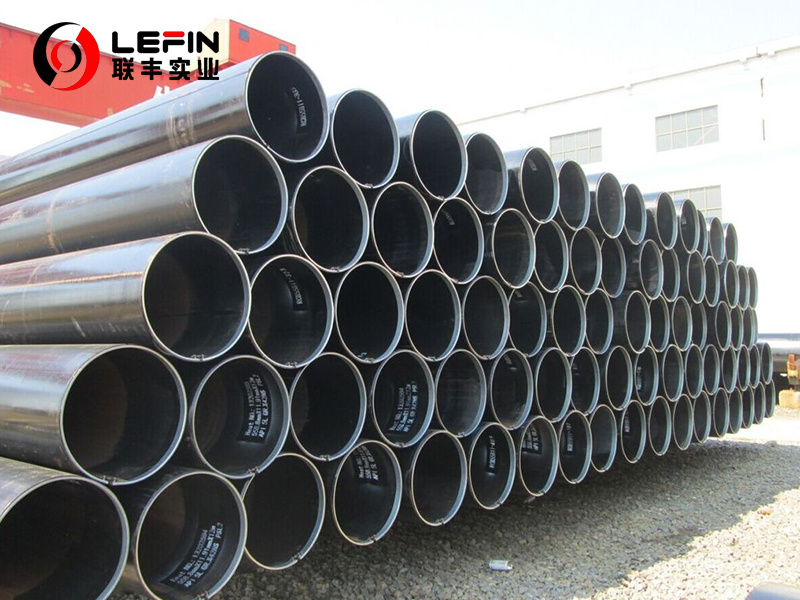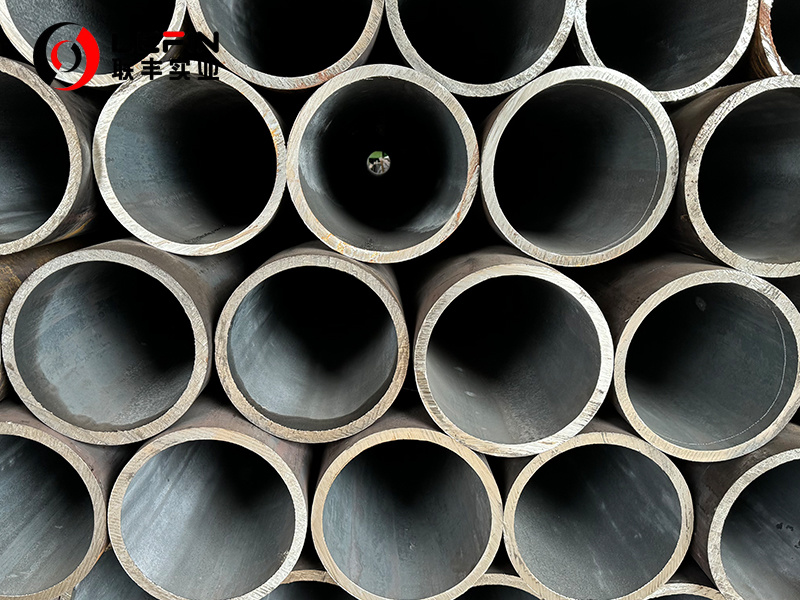


- Details
-
JIS G3444 STK490 is a Japanese Industrial Standard (JIS) specification for carbon steel tubes used for general structural purposes. Below is a detailed description of this material:
Standard Overview
Standard Number: JIS G3444Grade: STK490
Title: Carbon steel tubes for general structure
Scope: This standard specifies requirements for seamless and welded carbon steel tubes used in construction, machinery, and other structural applications where strength and weldability are required.
Chemical Composition
Carbon (C): Maximum 0.18%. Carbon is the primary strengthening element in steel, but too much can reduce its toughness and weldability.Silicon (Si): Maximum 0.55%. Silicon can improve the steel's strength and hardness, and it also has some deoxidizing effects.
Manganese (Mn): Maximum 1.65%. Manganese enhances the steel's toughness and wear resistance.
Phosphorus (P): Maximum 0.035%. Phosphorus is kept to a low level to avoid brittleness.
Sulfur (S): Maximum 0.035%. Like phosphorus, sulfur is also controlled to prevent brittleness.
Mechanical Properties
Tensile Strength: Minimum 490 N/mm². This indicates the maximum stress the material can withstand while being stretched or pulled before breaking.Yield Strength: Minimum 315 N/mm². Yield strength is the stress at which a material begins to deform plastically.
Elongation: Minimum 23% for tubes with an outside diameter of over 40 mm. Elongation measures the ductility of the steel, which is its ability to be stretched without breaking.
Flattening Resistance: The distance between flat plates should be 7/8D (D represents the outside diameter of the tube).
Bendability: The bending angle is 90° with an inside radius of 6D.

Manufacturing Methods
Seamless: Manufactured by hot rolling or cold drawing without a seam.Electric Resistance Welded (ERW): Tubes are made by welding the edges of a steel strip together.
Butt Welded: The ends of two steel pipes are welded together.●●
Automatic Arc Welded: The welding process is automated using an arc.
● Surface Treatment
Coating: Tubes can be coated to protect against corrosion.Painting: Painting can be applied for aesthetic purposes and additional corrosion resistance.
Galvanizing: A galvanized coating can be applied to enhance corrosion resistance.
Dimensions And Tolerances
● Dimensions
Outside Diameter: Ranges from 21.7 mm to 1016.0 mm.( Detailed description to see JIS G3444-2021 table six. )Wall Thickness: Ranges from 2.0 mm to 22 mm.( Detailed description to see JIS G3444-2021 table six.)
Length: Typically 3 to 18 meters
● Tolerances
Outside Diameter Tolerance a)
Classification Outside Diameter b) Tolerances on Applicable Division Outside Diameter c) Class 1 Under 50mm ± 0.5mm Applied when there is no specification. Applicable to hot-finished seamless steel tubes. 50mm or Over ± 1% Class 2 Under 50mm ± 0.25mm Applied when there is a specification. Not applicable to hot-finished seamless steel tubes. 50mm or Over ± 0.5% Notes a) For the local parts such as repaired parts if the wall thickness can be confirmed to be within the tolerance in the table below, the outside diameter tolerance of this table need not be applied. b) The method for measuring the outside diameter of tubes exceeding 350mm in outside diameter may be determined by the circumferential length. The mutual conversion of outside diameter D and the circumferential length l shall be by the following formula: D = l / π Where D: outside diameter (mm) l: circumferential length (mm) π:3.1416 c) The tolerances on the outside diameter of ends of electric resistance welded and automatic arc welded steel tubes exceeding 350mm in outside diameter shall be ±0.5%。 Wall Thickness Tolerance a)
Classification For Seamless Steel Tube For Other than Seamless Steel Tube Applicable Division Wall Thickness Tolerance of Wall Thickness Wall Thickness Tolerance of Wall Thickness Class 1 Under 4mm +0.6mm, -0.5mm Under 4mm +0.6mm, -0.5mm Applied when there is no specification. Applicable to hot-finished seamless steel tubes. 4mm or Over +15%, -12.5% 4mm or Over to and excl. 12mm +15%, -12.5% 12mm or Over +15%, -1.5mm Class 2 Under 3mm ±0.3mm Under 3mm ± 0.3mm Applied when there is a specification. Not applicable to hot-finished seamless steel tubes. 3mm or Over ±10% 3mm or Over to and excl. 12mm ±10% 12mm or Over +10%,-1.2mm Notes a) The tolerances on the wall thickness of tubes exceeding 1016.0 mm in outside diameter may be agreed upon between the manufacturer and the purchaser.

Testing & Inspection
Tensile test, bend test, flattening test, hydrostatic test.
Non-destructive testing (NDT) for weld integrity (if ERW).
Applications
Structural Purposes: Ideal for use in construction, bridges, and other structural applications where strength and durability are required.Civil Engineering: Suitable for applications such as scaffolding, supports, and piles.
Architecture: Used in architectural elements that require high strength and aesthetic appeal.
General Engineering: Applicable in various engineering projects where carbon steel is preferred for its cost-effectiveness and strength.
Conclusion
JIS G3444 STK490 is a versatile and high-quality carbon steel pipe that meets the stringent requirements of the Japanese Industrial Standards. Its balanced chemical composition and superior mechanical properties make it suitable for a wide range of applications in construction, engineering, and architecture.


JIS G3444 STK490 Carbon Steel Tubes
Subcategory
Keyword
- Details
-
JIS G3444 STK490 is a Japanese Industrial Standard (JIS) specification for carbon steel tubes used for general structural purposes. Below is a detailed description of this material:
Standard Overview
Standard Number: JIS G3444Grade: STK490
Title: Carbon steel tubes for general structure
Scope: This standard specifies requirements for seamless and welded carbon steel tubes used in construction, machinery, and other structural applications where strength and weldability are required.
Chemical Composition
Carbon (C): Maximum 0.18%. Carbon is the primary strengthening element in steel, but too much can reduce its toughness and weldability.Silicon (Si): Maximum 0.55%. Silicon can improve the steel's strength and hardness, and it also has some deoxidizing effects.
Manganese (Mn): Maximum 1.65%. Manganese enhances the steel's toughness and wear resistance.
Phosphorus (P): Maximum 0.035%. Phosphorus is kept to a low level to avoid brittleness.
Sulfur (S): Maximum 0.035%. Like phosphorus, sulfur is also controlled to prevent brittleness.
Mechanical Properties
Tensile Strength: Minimum 490 N/mm². This indicates the maximum stress the material can withstand while being stretched or pulled before breaking.Yield Strength: Minimum 315 N/mm². Yield strength is the stress at which a material begins to deform plastically.
Elongation: Minimum 23% for tubes with an outside diameter of over 40 mm. Elongation measures the ductility of the steel, which is its ability to be stretched without breaking.
Flattening Resistance: The distance between flat plates should be 7/8D (D represents the outside diameter of the tube).
Bendability: The bending angle is 90° with an inside radius of 6D.

Manufacturing Methods
Seamless: Manufactured by hot rolling or cold drawing without a seam.Electric Resistance Welded (ERW): Tubes are made by welding the edges of a steel strip together.
Butt Welded: The ends of two steel pipes are welded together.●●
Automatic Arc Welded: The welding process is automated using an arc.
● Surface Treatment
Coating: Tubes can be coated to protect against corrosion.Painting: Painting can be applied for aesthetic purposes and additional corrosion resistance.
Galvanizing: A galvanized coating can be applied to enhance corrosion resistance.
Dimensions And Tolerances
● Dimensions
Outside Diameter: Ranges from 21.7 mm to 1016.0 mm.( Detailed description to see JIS G3444-2021 table six. )Wall Thickness: Ranges from 2.0 mm to 22 mm.( Detailed description to see JIS G3444-2021 table six.)
Length: Typically 3 to 18 meters
● Tolerances
Outside Diameter Tolerance a)
Classification Outside Diameter b) Tolerances on Applicable Division Outside Diameter c) Class 1 Under 50mm ± 0.5mm Applied when there is no specification. Applicable to hot-finished seamless steel tubes. 50mm or Over ± 1% Class 2 Under 50mm ± 0.25mm Applied when there is a specification. Not applicable to hot-finished seamless steel tubes. 50mm or Over ± 0.5% Notes a) For the local parts such as repaired parts if the wall thickness can be confirmed to be within the tolerance in the table below, the outside diameter tolerance of this table need not be applied. b) The method for measuring the outside diameter of tubes exceeding 350mm in outside diameter may be determined by the circumferential length. The mutual conversion of outside diameter D and the circumferential length l shall be by the following formula: D = l / π Where D: outside diameter (mm) l: circumferential length (mm) π:3.1416 c) The tolerances on the outside diameter of ends of electric resistance welded and automatic arc welded steel tubes exceeding 350mm in outside diameter shall be ±0.5%。 Wall Thickness Tolerance a)
Classification For Seamless Steel Tube For Other than Seamless Steel Tube Applicable Division Wall Thickness Tolerance of Wall Thickness Wall Thickness Tolerance of Wall Thickness Class 1 Under 4mm +0.6mm, -0.5mm Under 4mm +0.6mm, -0.5mm Applied when there is no specification. Applicable to hot-finished seamless steel tubes. 4mm or Over +15%, -12.5% 4mm or Over to and excl. 12mm +15%, -12.5% 12mm or Over +15%, -1.5mm Class 2 Under 3mm ±0.3mm Under 3mm ± 0.3mm Applied when there is a specification. Not applicable to hot-finished seamless steel tubes. 3mm or Over ±10% 3mm or Over to and excl. 12mm ±10% 12mm or Over +10%,-1.2mm Notes a) The tolerances on the wall thickness of tubes exceeding 1016.0 mm in outside diameter may be agreed upon between the manufacturer and the purchaser.

Testing & Inspection
Tensile test, bend test, flattening test, hydrostatic test.
Non-destructive testing (NDT) for weld integrity (if ERW).
Applications
Structural Purposes: Ideal for use in construction, bridges, and other structural applications where strength and durability are required.Civil Engineering: Suitable for applications such as scaffolding, supports, and piles.
Architecture: Used in architectural elements that require high strength and aesthetic appeal.
General Engineering: Applicable in various engineering projects where carbon steel is preferred for its cost-effectiveness and strength.
Conclusion
JIS G3444 STK490 is a versatile and high-quality carbon steel pipe that meets the stringent requirements of the Japanese Industrial Standards. Its balanced chemical composition and superior mechanical properties make it suitable for a wide range of applications in construction, engineering, and architecture.


Related products
Product Consulting

Address: Hengtai Road,Daqiuzhuang Town,Jinghai County,Tianjin,China
Mob: +8615122229899(whatspp)
Phone: +86 22 58171905
Fax: +86 22 58171902
E-mail:info@lefinsteel.com
Get company updates

Tianjin Lefin Industrial Co.,Ltd. All rights reserved City sub-station SEO www.300.cn

